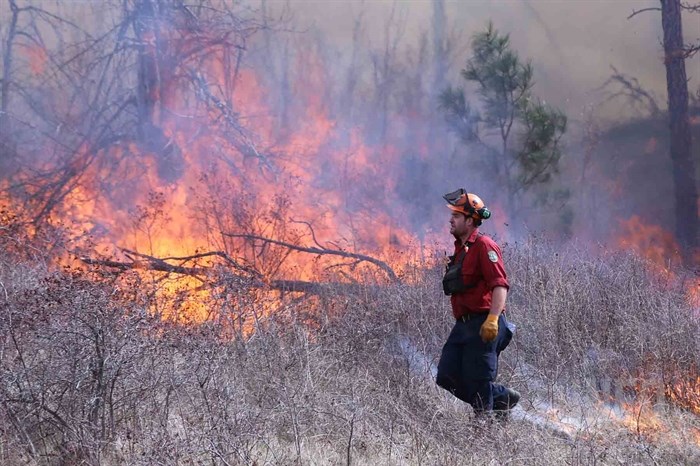
Wildland firefighters can spend days out in middle of the bush fighting a fire.
(JENNIFER STAHN / iNFOnews.ca)
July 10, 2020 - 3:28 PM
CN Rail has been ordered to pay $16,619,782 after a wildfire destroyed 2,255 hectares of land near Lytton in 2015.
The company had originally been slapped with a lesser fine, but an appeal from CN prompted a second look at the penalties. As a result, the Forest Appeals Commission ordered the company to pay almost $500,000 more.
The Cisco Road wildfire, which started on June 11, 2015, was ignited when sparks from CN Rail workers cutting railways lines landed on the nearby grass. At the time, the fire danger was listed as extreme and rail cutting was considered a high risk activity.
The fire spread to nearby Crown land and B.C. Wildfire personnel were deployed to battle the blaze. A First Nations community was evacuated and the town of Lytton was put on evacuation alert. Crews monitored the fire into September, and in October of 2015 the fire was deemed extinguished.
At the end of May 2018, CN Rail was ordered to pay just over $16.1 million for fire suppression efforts, the value of damaged land, and other penalties.
In its appeal, CN Rail said it believed it should not be liable for the entire area that was burned and appealed parts of the fine related to fire control costs as well as “other forest land resources” and “grass land resources” that were damaged or destroyed by the fire. According to the decision by the Forest Appeals Commission, CN Rail believed the approach by B.C. Wildfire Service caused the fire to increase in size. CN Rail also questioned the amount assessed for payroll costs.
The Forest Appeal Commission said its role is not to critique whether the Wildfire Service could have controlled a fire in a more efficient manner. Based on their findings, the commission determined that all of the burnt areas and fire control costs were caused directly or indirectly by CN Rail’s contraventions.
The commission did, however, find that none of the burned areas should be classified as “grass land resources” and were instead classified either as “other forest land resources” or non-vegetated land. The commission reduced the value of damaged or destroyed grass land resources, valued at $500 per hectare, to zero. However, they increased the value for damaged or destroyed other forest land resources, which are valued at $5,000 per hectare, from $8.9 million to nearly $9.4 million.
The decision was posted on Feb. 4, 2020 but was just revealed this week by Radio NL.
To contact a reporter for this story, email Jenna Wheeler or call (250) 819-6089 or email the editor. You can also submit photos, videos or news tips to the newsroom and be entered to win a monthly prize draw.
We welcome your comments and opinions on our stories but play nice. We won't censor or delete comments unless they contain off-topic statements or links, unnecessary vulgarity, false facts, spam or obviously fake profiles. If you have any concerns about what you see in comments, email the editor in the link above.
News from © iNFOnews, 2020